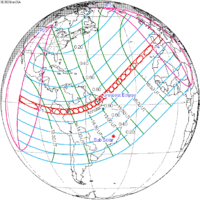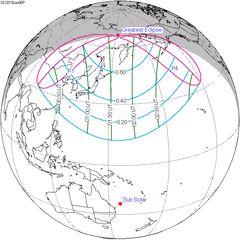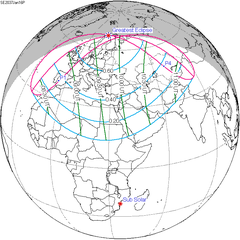January 2028 lunar eclipse
| Partial eclipse | |||||||||||||
 The Moon's hourly motion shown right to left | |||||||||||||
| Date | January 12, 2028 | ||||||||||||
|---|---|---|---|---|---|---|---|---|---|---|---|---|---|
| Gamma | 0.9817 | ||||||||||||
| Magnitude | 0.0679 | ||||||||||||
| Saros cycle | 115 (58 of 72) | ||||||||||||
| Partiality | 56 minutes, 0 seconds | ||||||||||||
| Penumbral | 250 minutes, 41 seconds | ||||||||||||
| |||||||||||||
A partial lunar eclipse will occur at the Moon’s descending node of orbit on Wednesday, January 12, 2028,[1] with an umbral magnitude of 0.0679. A lunar eclipse occurs when the Moon moves into the Earth's shadow, causing the Moon to be darkened. A partial lunar eclipse occurs when one part of the Moon is in the Earth's umbra, while the other part is in the Earth's penumbra. Unlike a solar eclipse, which can only be viewed from a relatively small area of the world, a lunar eclipse may be viewed from anywhere on the night side of Earth. Occurring only about 22.5 hours before perigee (on January 13, 2028, at 2:45 UTC), the Moon's apparent diameter will be larger.[2]
Visibility
[edit]The eclipse will be completely visible over North and South America, west Africa, and Europe, seen rising over the central Pacific Ocean and setting over central and east Africa and west and central Asia.[3]
 
|
Eclipse details
[edit]Shown below is a table displaying details about this particular solar eclipse. It describes various parameters pertaining to this eclipse.[4]
| Parameter | Value |
|---|---|
| Penumbral Magnitude | 1.04848 |
| Umbral Magnitude | 0.06787 |
| Gamma | 0.98177 |
| Sun Right Ascension | 19h32m47.8s |
| Sun Declination | -21°43'29.4" |
| Sun Semi-Diameter | 16'15.8" |
| Sun Equatorial Horizontal Parallax | 08.9" |
| Moon Right Ascension | 07h33m53.0s |
| Moon Declination | +22°41'18.2" |
| Moon Semi-Diameter | 16'35.1" |
| Moon Equatorial Horizontal Parallax | 1°00'52.0" |
| ΔT | 73.0 s |
Eclipse season
[edit]This eclipse is part of an eclipse season, a period, roughly every six months, when eclipses occur. Only two (or occasionally three) eclipse seasons occur each year, and each season lasts about 35 days and repeats just short of six months (173 days) later; thus two full eclipse seasons always occur each year. Either two or three eclipses happen each eclipse season. In the sequence below, each eclipse is separated by a fortnight.
| January 12 Descending node (full moon) |
January 26 Ascending node (new moon) |
|---|---|
 |

|
| Partial lunar eclipse Lunar Saros 115 |
Annular solar eclipse Solar Saros 141 |
Related eclipses
[edit]Eclipses in 2028
[edit]- A partial lunar eclipse on January 12.
- An annular solar eclipse on January 26.
- A partial lunar eclipse on July 6.
- A total solar eclipse on July 22.
- A total lunar eclipse on December 31.
Metonic
[edit]- Preceded by: Lunar eclipse of March 25, 2024
- Followed by: Lunar eclipse of October 30, 2031
Tzolkinex
[edit]- Preceded by: Lunar eclipse of November 30, 2020
- Followed by: Lunar eclipse of February 22, 2035
Half-Saros
[edit]- Preceded by: Solar eclipse of January 6, 2019
- Followed by: Solar eclipse of January 16, 2037
Tritos
[edit]- Preceded by: Lunar eclipse of February 11, 2017
- Followed by: Lunar eclipse of December 11, 2038
Lunar Saros 115
[edit]- Preceded by: Lunar eclipse of December 31, 2009
- Followed by: Lunar eclipse of January 22, 2046
Inex
[edit]- Preceded by: Lunar eclipse of January 31, 1999
- Followed by: Lunar eclipse of December 22, 2056
Triad
[edit]- Preceded by: Lunar eclipse of March 13, 1941
- Followed by: Lunar eclipse of November 12, 2114
Lunar eclipses of 2027–2031
[edit]| Lunar eclipse series sets from 2027–2031 | ||||||||
|---|---|---|---|---|---|---|---|---|
| Ascending node | Descending node | |||||||
| Saros | Date Viewing |
Type Chart |
Gamma | Saros | Date Viewing |
Type Chart |
Gamma | |
| 110 | 2027 Jul 18
|
Penumbral
|
-1.57589 | 115 | 2028 Jan 12
|
Partial
|
0.98177 | |
| 120 | 2028 Jul 06
|
Partial
|
-0.79040 | 125 | 2028 Dec 31
|
Total
|
0.32583 | |
| 130 | 2029 Jun 26
|
Total
|
0.01240 | 135 | 2029 Dec 20
|
Total
|
-0.38110 | |
| 140 | 2030 Jun 15
|
Partial
|
0.75346 | 145 | 2030 Dec 09
|
Penumbral
|
-1.07315 | |
| 150 | 2031 Jun 05
|
Penumbral
|
1.47322 | |||||
| Last set | 2027 Aug 17 | Last set | 2027 Feb 20 | |||||
| Next set | 2031 May 07 | Next set | 2031 Oct 30 | |||||
Saros 115
[edit]It is part of Saros series 115.
Half-Saros cycle
[edit]A lunar eclipse will be preceded and followed by solar eclipses by 9 years and 5.5 days (a half saros).[5] This lunar eclipse is related to two partial solar eclipses of Solar Saros 122.
| January 6, 2019 | January 16, 2037 |
|---|---|

|

|
See also
[edit]Notes
[edit]- ^ "January 11–12, 2028 Partial Lunar Eclipse". timeanddate. Retrieved 19 November 2024.
- ^ "Moon Distances for London, United Kingdom, England". timeanddate. Retrieved 19 November 2024.
- ^ "Partial Lunar Eclipse of 2028 Jan 12" (PDF). NASA. Retrieved 19 November 2024.
- ^ "Partial Lunar Eclipse of 2028 Jan 12". EclipseWise.com. Retrieved 19 November 2024.
- ^ Mathematical Astronomy Morsels, Jean Meeus, p.110, Chapter 18, The half-saros
External links
[edit]- 2028 Jan 12 chart: Eclipse Predictions by Fred Espenak, NASA/GSFC



